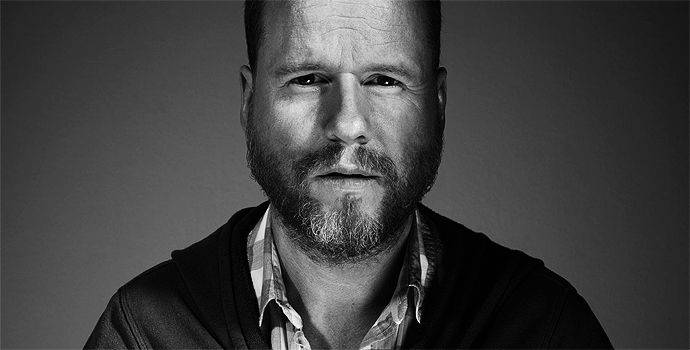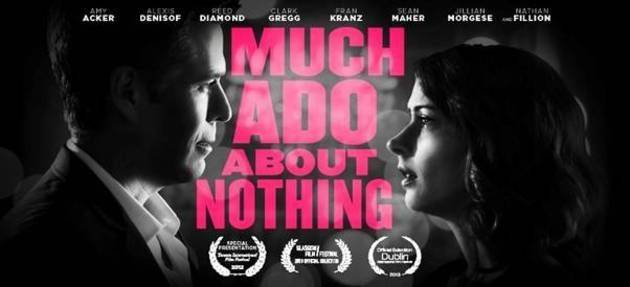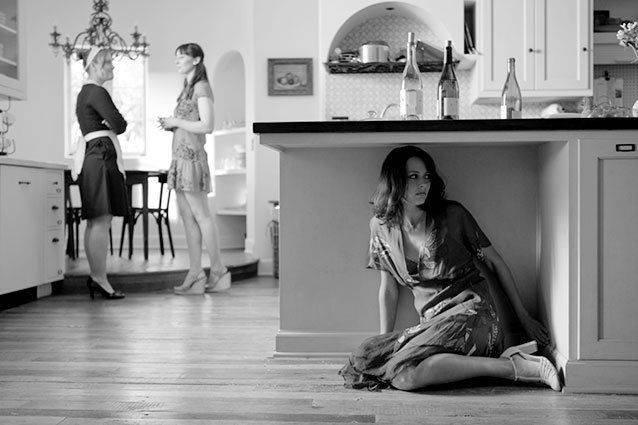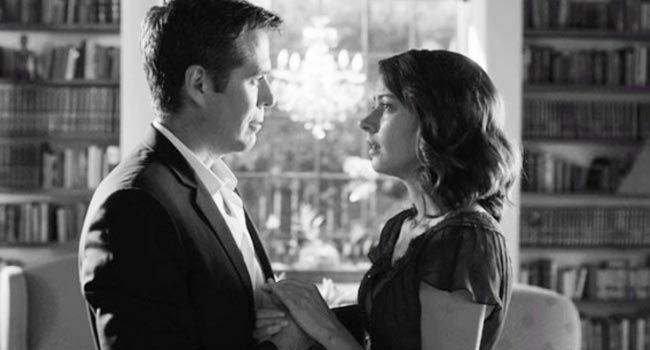If you haven’t heard the story yet, it’s a good one. No, not the story of Shakespeare’s play Much Ado About Nothing, although it’s really good, too. I’m talking about the story of how Joss Whedon (pictured below), beloved creator of television’s Buffy the Vampire Slayer and Firefly, managed to direct a film adaptation of Shakespeare’s wit-fueled romantic comedy in just a scant couple of weeks.

A little background is required here. First, Whedon’s love of Shakespeare isn’t a recent thing. In fact, during breaks from filming his popular TV shows, he often gathered several friends (including actors from his casts) for readings of Shakespeare’s plays. The makeup of the group would change from project to project, but Whedon was always at the center of the eclectic living-room troupe, enjoying the interplay of comedy and drama. Over the years, as Whedon moved from Buffy to Angel to Firefly to Dollhouse (and on), his stable of actors and readers grew and changed, an enjoyable offshoot of which was that actors began making frequent appearances in his work the way familiar faces tend to pop up in the work of Aaron Sorkin or David Mamet. Seeing Alan Tudyk show up on Dollhouse, for instance, wasn’t so much a surprise as a welcome visit from a friend…
And then Whedon directed the biggest freaking movie of all time.
Last summer, when Whedon delivered Marvel’s The Avengers, I wondered if the small screen would lose him for good. I wondered if cranking out sequels for the blockbuster ensemble flick would become his new occupation, in addition to overseeing Marvel’s entire slate of films the way Christopher Nolan does for DC. (It turns out that my fears were unfounded, as Whedon is already exec producing the new television show Agents of S.H.I.E.L.D. for ABC.) Anyhoo, after the press junket onslaught of summer movie season ended, Whedon returned to his love of Shakespeare with friends and managed to turn his post-Avengers “down-time” into a sparkling, charming little film now delighting audiences at the Art Theater Co-op.

Whedon’s Much Ado was shot entirely at his home, making it quite possibly the most creative result of a “staycation” ever. The idea is so simple and so insurmountable-sounding at the same time: all you need is a great script (which Shakespeare already wrote), some great actors (which Whedon would have had over for dinner anyway), and a great location (where Whedon already lived). Now just make a movie, dammit.
 Whedon’s is a modern take on the classic, with dialogue intact, meaning that “I have read in this letter” refers to an email received on an iPhone, not a bit of parchment. And when people speak of torches, they’re most likely looking at a flashlight. Otherwise, for anyone with a passing knowledge of the Bard’s work, the result is easy to follow and completely enjoyable.
Whedon’s is a modern take on the classic, with dialogue intact, meaning that “I have read in this letter” refers to an email received on an iPhone, not a bit of parchment. And when people speak of torches, they’re most likely looking at a flashlight. Otherwise, for anyone with a passing knowledge of the Bard’s work, the result is easy to follow and completely enjoyable.
The plot, for the uninitiated, is a round-robin of romantic relationships, misunderstandings, and witty quips. As the film opens, Don Pedro of Aragon (played by Dollhouse’s Reed Diamond) arrives at the home of an old friend, Leonato (The Avengers’ Clark Gregg). Don Pedro, being an important man returned from abroad, brings with him an entourage, including the young Claudio (Cabin in the Woods’ Fran Kranz), the sarcastic womanizer Benedick (Alexis Denisoff Denisof, who played Wesley on Buffy and Angel), and Don Pedro’s evil half-brother Don John (Firefly’s Sean Maher, stealing scenes left and right). The Don’s whole gaggle will be staying with Leonato for a while, partying and luxuriating in their host’s opulence.
Upon the guests’ arrival, a pair of romantic entanglements are revealed: first, Claudio has fallen in love with Leonato’s daughter Hero (Jillian Morgese, who had a couple of blink-and-you’ll-miss-her appearances in the Whedonverse); second, Benedick has a “merry war” of words and affection with Leonato’s niece Beatrice, who is played by the absolutely smashing Amy Acker (from Angel fame). Benedick swears he will never marry, and Beatrice claims she cannot stand him, but their attraction is obvious, and their friends conspire to bring them into a relationship.
 Along the way, there is much eavesdropping and a few major misunderstandings. Chief among these is a manufactured liaison between one of Don John’s henchmen and Margaret, a maid at Leonato’s estate. The encounter is witnessed by Don Pedro and Claudio, hiding nearby at Don John’s behest; the villain John convinces them that they are actually seeing Hero with a secret lover. Poor Claudio believes this, Don Pedro is outraged, and the wedding is very publicly ruined.
Along the way, there is much eavesdropping and a few major misunderstandings. Chief among these is a manufactured liaison between one of Don John’s henchmen and Margaret, a maid at Leonato’s estate. The encounter is witnessed by Don Pedro and Claudio, hiding nearby at Don John’s behest; the villain John convinces them that they are actually seeing Hero with a secret lover. Poor Claudio believes this, Don Pedro is outraged, and the wedding is very publicly ruined.
Seems a little heavy, right? Not to worry. From there we see, in fairly short order, the discovery of the truth, the reclamation of Hero’s good name, the sparring courtship of Benedick and Beatrice, and the eventual wedding of the various pairs of lovers. In other words, all’s well that ends well.
Since the plot of the play is so well known, and the devices of “modernized” Shakespeare fairly common (and since trying to explain coherently the various threads of a Shakespearean comedy is a bit like trying to tell someone how delicious a rainbow tastes), I will turn my attention instead to the performances of the film. I am thrilled to report that, for the vast majority of the cast, the work done here is extraordinary.
I must give special attention to the performance of Amy Acker as Beatrice. This is such a high profile role for an actress, not only because of the size of the role in the play, but also because of the indelible impression left by the great Emma Thompson in the film version directed by her then husband Kenneth Branagh. Acker has some huge shoes to fill, and she acquits herself marvelously, nailing Beatrice’s biting humor, her inner longing, and some truly impressive physical comedy along the way. I sincerely hope this is a breakout role for Acker, whom I will admit I never cared much for previously. I am now diligently reevaluating all past comments about her. She was just that good.

As her verbal opponent and eventual lover, Alexis Denisof is engaging as the somewhat smarmy, intellectual Benedick. His acting style is a bit more mannered and less natural than Acker’s Beatrice, but even so, there are moments in this film in which he is enthralling, making one wonder if an actor from a bygone era has wandered into the frame.
 Other standout performances are given by Reed Diamond (pictured, left) as the matchmaking Don Pedro, who has a touch of melancholy even as he meddles and makes mirth, and by Fran Kranz, whose lovelorn Claudio is a whiplash-inducing departure from the stoner fool he played in Cabin in the Woods.
Other standout performances are given by Reed Diamond (pictured, left) as the matchmaking Don Pedro, who has a touch of melancholy even as he meddles and makes mirth, and by Fran Kranz, whose lovelorn Claudio is a whiplash-inducing departure from the stoner fool he played in Cabin in the Woods.
And, yes, I would be remiss were I to leave out the performances of geek icon Nathan Fillion and Buffy alum Tom Lenk as Constable Dogberry and his trusty lieutenant, respectively. Whereas, in Branagh’s Much Ado, Michael Keaton and Ben Elton played these parts as a sort of filth-smeared take on Monty Python, Fillion and Lenck make a perfect pair of inept private security professionals. Their interplay does wink at the camera a bit, figuratively speaking, but the fact that they’re in on the joke is perhaps one of the most Shakespearean of all conceits.
As a whole, this was one of the most successful and enjoyable adaptations of Shakespeare I’ve ever encountered. Shot in crisp, gorgeous black-and-white, the film moves deftly between comedy and tragedy, between broad slapstick and genuine emotion. I simply cannot recommend it highly enough.
Much Ado About Nothing will continue to run as often as humanly possible at the Art Theatre Co-op… or for at least a couple of weeks. Go see it. Take people with you. And then tell others to do the same.








